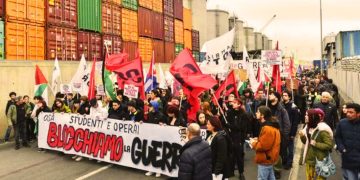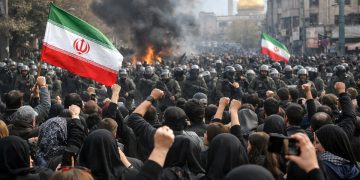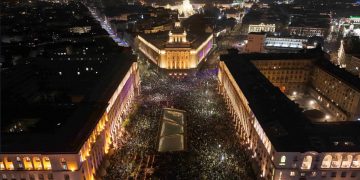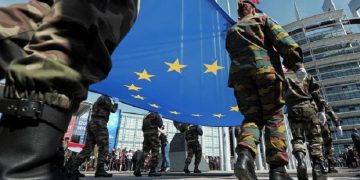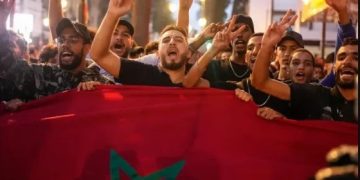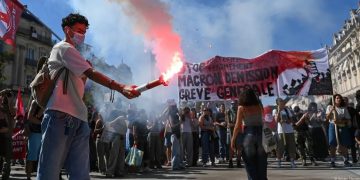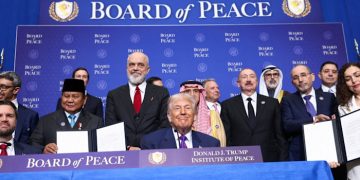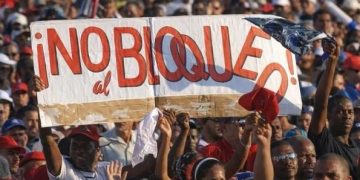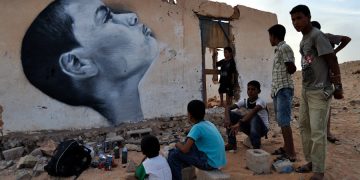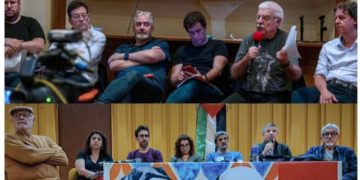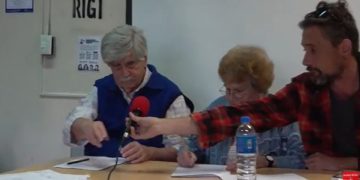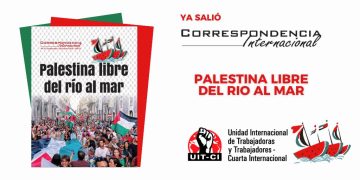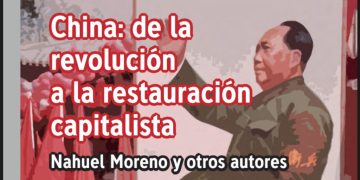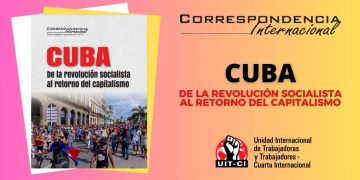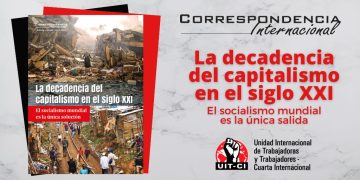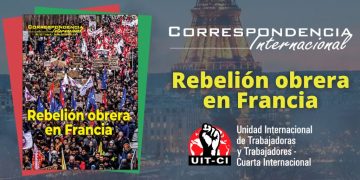The fall of dictatorships that were in power for nearly 40 years in Tunisia, Egypt and Libya has been a revolutionary victory of the movement of the Arab and world masses and has made a big impact. The revolutionary process in the countries of North Africa and the Middle East not only has created a revolutionary situation in the whole area, but it has also influenced the class struggle worldwide. Struggles have emerged as the «Indignados» (Outraged) movement in Europe and Occupy Wall Street, in the U.S., taking the example of the struggle of the Arab peoples. In the same vein, it also provided a new impetus to the struggle of the Palestinian people, as seen in the occupation of the Israeli embassy in Cairo by the Egyptian masses, the same day that Qaddafi fled Tripoli. The Palestinian requests to the UN for recognition as a full member or the rapprochement between the PLO and Hamas toward a possible alliance have been examples of these changes and the impact of the first victories of the Arab revolution.
On the other hand, this revolution has been a huge blow against imperialism that deepens its crisis of political and military domination. The fall of Mubarak is a very important defeat since it loses a key ally for the Middle East. The new Egyptian government, for example, was forced to lift the blockade on the border with the Gaza Strip. Another obvious symptom of the weakness of the U.S. is intervening in Libya because they could not do directly due to the popular rejection, and it only was limited to logistical support and the military intervention of NATO. Even this option was an attempt of imperialist counter-offensive to see if it could counter the defeats suffered and establish a «beachhead» in Libya. But the fall of the Qaddafi dictatorship due to rebel action caused the failure of this objective and Libya became the third anti-dictatorial triumphant revolution.
The Tunisian and Egyptian revolutions spread like wildfire throughout the region. To Libya first, now clearly to Syria, but also in the demonstrations in Bahrain, Yemen and even in Morocco. This confirms that the revolution that started in Tunisia in December 2010 is a global revolutionary process, covering the entire region.
These Revolutions have provoked much debate in the left
It is evident that the triumph of Arab revolutionary process has provoked much debate in the ranks of the currents that define themselves as left or anti-imperialist, first on whether the process was a revolution or not. And secondly, on whether they were valid revolutions or simple manoeuvres of imperialism to defeat the nationalist populist governments. The social democracy and socialist parties which are government in Europe and various parts of the world took a clearly counter-revolutionary position. They shared the concern of their own bourgeoisie along with U.S. imperialism, first supporting the Arab dictatorships and then when they saw that these regimes could no longer survive because of the rebellions, they supported opposition movements and began to try to control the revolution and the alternative leaderships.
Moreover, the governments of Hugo Chavez and the Castro brothers in Cuba and the nationalists left currents placed themselves against the rebel masses and supported dictatorial regimes like Qaddafi in Libya and Bashar al-Assad in Syria, as if they were «anti-imperialist governments» and defining the revolutions as «imperialist plots «. Actually, it is former bourgeois nationalist leaders that became partners and allies of multinationals. Qaddafi agreed in 2007 to the return to Libya of oil multinationals such as BP, Exxon, Total and Shell. Bashar al-Assad not only opened the country to foreign investment, but he was part of the imperialist military coalition which in 1991 triggered the Gulf War against Iraq. The wrong stance taken by sections of the reformist left, communist parties and other sections of the Chavist international left has been a serious obstacle to solidarity with the Arab masses, especially with the Syrian revolution.
They are unfinished revolutions
Great democratic revolutions triumphed which, due to the lack of a revolutionary leadership, failed to advance to the triumph of the socialist revolution. The Arab revolutions began as spontaneous revolts of the masses, outside of the intervention or direct influence of traditional nationalist or Islamic leaderships. It is a fact, for example, that the Islamic parties, especially the Muslim Brotherhood, initially did not support revolutionary mobilizations in both Tunisia and Egypt.
The lack of an organized leadership, beyond local leaders, defines the spontaneous nature of these revolutions. Both the strength and the limitations of these revolutions arise from that character. On the other hand, especially in Tunisia and Egypt, despite the fall of dictatorships, aspects of the old dictatorial regime still continue and fundamentally the capitalist economy continues. Whereupon, it means they are unfinished revolutions. A new stage of the revolutionary process has opened, and new tasks, where the axis that orders the fighting program is to achieve the power for the workers to permanently solve both democratic and social problems such as wages, work, food, health and education.
The current reality of the working class and popular struggles in Egypt and Tunisia show that it follows the revolutionary process. The masses continue mobilizing, seeking to break the straitjacket that imperialism, the bourgeoisie and the reformists in power wants to put on them. Precisely, the big fight is to give continuity to these mobilizations for economic, social and political claims, with the strategic objective of achieving a new revolutionary leadership with weight in the working class.
From the outset, another debate has existed in the world left on the character of the revolution. Large sections have argued that the revolution should be kept in a democratic stage, rejecting the need to fight for a new revolution to provoke a social liberation with anti-capitalist measures, headed by new governments of the workers, which provide solutions to the needs of the masses. These sectors of the world left again recreate the old grim Stalinist conception of revolution by stages. In other words that the revolution must necessarily pass through two separate stages: the first, in which bourgeoisie should be accepted or supported to achieve democratic tasks. And the second stage, when just then the working class and the people can fight for socialism. The reality is showing that this view is wrong.
Clearly, U.S. and European imperialism now allied to the new Islamic governments that took power in Tunisia, Egypt and Libya, try that all political and democratic freedoms won by the activity of the masses during the revolutionary process be reduced to a minimum under a bourgeois constitutional system. And with this policy, that we call of democratic reaction, attempting to stop the revolution and that it only advance to a social democratic transformation, within the framework of keeping capitalism and the relationship with multinationals in these countries.
In summary, the whole argument that sustained and still sustains that the Arab revolutions have to stop at the democratic stage for social consolidation, and that after that task it might move towards a socialist transformation, is wrong and inconsistent with reality.
Instead of democracy, what exist in the countries where dictators were overthrown are repeated authoritarian and repressive attempts that provoke new clashes with the masses, as in Egypt and Tunisia. In these countries, rather than total control by Islamic leaderships, we see how the people face and cause crises in the Islamic governments as well, precisely because they do not solve democratic problems and even less the very serious social problems.
These facts show, once again, that the democratic goals of the revolutions in these semicolonial countries and dependent on imperialism cannot be achieved under bourgeois leaderships and governments, whether Islamic or secular, but only through working and popular governments. And it is in this sense that we understand that the Arab revolutions reaffirm the concept of permanent revolution.
The Syrian revolution
In Syria is still open the revolutionary struggle to end the dictatorship of Bashar al-Assad and its triumph is key to the Middle East. There is a new Libya-style counterrevolutionary attempt to seek to crush the revolution through fascist methods (systematic bombardment on rebel cities). The strength of the masses doomed the armed counterrevolution in Libya. There is a similar fight in Syria. There the central task is to promote unconditional solidarity with the Syrian people’s resistance without giving any political support to Assad’s bourgeois and pro-imperialist opposition, the SNC (Syrian National Council).
The Syrian revolution, which began in March 2011, has become a protracted civil war. The reasons for the mass uprising in Syria are almost the same as those found in the other Arab countries. The neoliberal policies carried out in the country in the last decade economically destroyed the agricultural areas, especially cities like Daraa, the peasant’s loss of their lands, economic and social cuts, repression and terror exercised by the regime on the masses were the reasons that triggered the insurrection.
While imperialism at first demanded reforms to al-Assad, on seeing that the regime was losing its legitimacy with the masses and that the process was taking a dynamic of revolutionary civil war, began to demand the resignation of the dictator. On the other hand, it began to negotiate with the alternative bourgeois leaderships, including, primarily, the Syrian Muslim Brotherhood, with the collaboration of the governments of Turkey and Qatar.
Currently, the leadership recognized by imperialism, the SNC, is headed by the Muslim Brotherhood, several bourgeois parties and some Kurdish organizations. The SNC has the program to build a «civil democratic state» and the strategy of imperialism and the so-called Friends of Syria is to build an «orderly democracy», which actually is intended to undermine the revolution with small changes in the regime, without touching in its essence the capitalist economic structure of Syria and trying to prevent the triumph of a revolution that would call into question the relationship with Israel and Turkey, Iraq and Iran, which are neighbouring countries. For that reason it is key, as much for imperialism as for the Arab revolution, who triumphs in Syria.
In the revolutionary process organizations were born, especially of the youth, under the name Local Coordination Committees (LCC). They are kind of neighbourhood groups that were promoting civil disobedience as closing schools or shops and other forms of struggle. Later the Free Syrian Army (FSA) emerged, which has spread throughout the country, composed of various Islamic or non-Islamic groups from all regions. No doubt that this rebel army has unified all armed groups against the dictatorship. What is not entirely clear is who prevails in its leadership. The FSA has been strengthened with defectors from the Assad army, both officers and non-commissioned officers and soldiers. Of course, it is evident that there is an influence in the leadership of the FSA of the Muslim Brotherhood, via former Syrian army officers. Although there are still many contradictions with each armed group in each town, cluster and each commander. It weighs negatively, for example, the actions of Islamic groups, ultra-sectarian religious as Al-Nusra Front, that want to impose on the people sharia law.
Nevertheless, the reality is that the armed resistance has strengthened and advancing in their weapons, even in the taking of airports or detachments. And they already control a large part of the country and the border posts.
The Syrian revolution has opened another deep debate in the world left. On one side is the Castro-Chavist sector and the recycled Stalinists directly supporting the genocidal Bashar al-Assad and accusing, as in Libya, the Syrian popular revolt as agents of imperialism and the CIA. They defend the dictator as if he led a leftist revolutionary government, when in fact he is a genocidal dictator who long ago became a partner of imperialism.
And there is a second sectarian approach, which we might call the «neither-nor», denouncing Bashar al-Assad as a dictator to be overthrown and in turn do not support in full the popular revolution due to the bourgeois leadership of the SNC. Their propaganda program is: neither Bashar al-Assad nor the pro-bourgeois SNC, «for a proletarian and popular solution, for a socialist revolution in Syria.»
And there exists a third position, which is that of revolutionary socialists, we promote the widest unity of action under the slogan «down Bashar al-Assad» and as part of the revolutionary movement, differentiating ourselves of their bourgeois leadership, especially of the SNC. Our slogans are clear: we call to boost unconditional solidarity with the resistance the Syrian people, without giving any support to the bourgeois and pro-imperialist of leadership of the SNC. We call to develop the popular armament and defence committees of the Syrian people, rejecting and denouncing the attempt of imperialist interference and military intervention of the UN and of NATO. Without failing to tell the heroic Syrian people that only a government based on their insurgents organizations and of the workers and popular sectors can lead to conquer their key democratic and social objectives.
This is not the first that this confusion exists in the international left, especially in the sectarian left: to confuse a progressive movement in civil war or in mass mobilizations against dictatorships with their counter-revolutionary and reformists leaderships. Revolutionary socialists support the progressive movement, in this case against the dictator Bashar al-Assad, without supporting the leadership of that movement.
This same debate happened during the Spanish Civil War of 1936-39 or the 1979 Nicaraguan revolution. The Trotskyists were in the Spanish civil war on the same military republican side against fascism and Franco, as we were on the same military camp in the civil war in Nicaragua, with the Sandinista National Liberation Front, without supporting Ortega y Fidel Castro leadership. In the Spanish Civil War, Leon Trotsky was clear when asked repeatedly why he criticized fascism and also criticized the bourgeois and Stalinist leadership of Republican Popular Front and Joseph Stalin himself; who was a traitor to the combat of the proletariat and the Spanish peasants. Trotsky replied that «the revolutionary proletariat cannot place the two fighting camps in the same bag: it must use this fight for its own interests. You cannot achieve success with a neutral policy but, on the contrary, militarily hitting their number one enemy: fascism» (Revolutionary Spain, p. 263, Editorial Antidoto). And he added: «Every Trotskyist should be a good soldier in Spain» (idem, p. 223).
The revolutionary socialists continue in Syria the same tactic advised by Trotsky for Spain in 1936. We do not lump in the same bag the genocidal army of Bashar al-Assad with the rebel popular army. We are on the same military rebel side, differentiating ourselves from its leadership. But as in Spain, as Trotsky advised, Trotskyists in Syria should be «good soldiers» of the armed rebellion.
Therefore we call upon the peoples of the world to unconditionally support the Arab revolution and we are against any imperialist intervention, either directly or through NATO or the UN. Similarly, we condemn the threats and actions of the genocidal state of Israel to bomb Syrian areas. We call on the Arab peoples of Tunisia and Egypt, and especially the Libyan militias, to send weapons to the resistance. And we call on the governments of the world to break with the Assad dictatorship.
Palestine is part of the process
It is evident that the progress of the Arab revolution has strengthened the Palestinian people, who at first sympathized with these revolutions, despite the silence of their leadership, both the Palestinian Authority (former PLO) and Hamas. It is a fact that a new situation for the Palestinian cause has opened, as demonstrated by the reaction to one of the latest Israeli offensives on Gaza, where the Palestinian people went out to resist and Israel showed its international political isolation. Zionism no longer has its faithful ally Mubarak to suppress the Egyptian masses. The new Cairo government had to act under great pressure from the Egyptian people and youth, who unconditionally support the Palestinian people. The open process of Arab revolutions in the area has allowed to stop a new slaughter in Gaza as what happened years ago. At the same time, there were growing mobilizations that break the division and control areas that had handed out Hamas in Gaza and Fatah in the West Bank. The requirement of unity from grassroots against the Israeli and imperialist enemy that the people claim is a component that seeks the restoration of the unity between Gaza and the West Bank to make stronger the fight against the Zionist occupation.
The UN recognition of Palestine as an Observer State, although it does not bring any real solution to the Palestinian people, you cannot fail to recognize it as a great political victory against Israel and against imperialism that gives a new strength to the fight of the Palestinian people. It is clear that the imperialist policy of trying to impose the two States, which was agreed years ago by the PLO, imperialism and Zionist leadership, has been failing. It has been in evidence that no other solution than the uncompromising struggle against the Zionist enclave, to destroy it and to impose a single state, secular, democratic and non-racist in all Palestine, where Arabs and Jews can live together.
Tunisia and Egypt, the permanent revolt
In Egypt and Tunisia, the protests have continued and spread to political claims (civil government, dissolution of the dictatorial regime institutions) and economic (work and wage increases) that neither the government of Morsi of the Muslim Brotherhood in Egypt nor Al-Nahda in Tunisia are cable to respond. While the demonstrations give continuity to the revolution, the regimes seek measures and new leaderships to safeguard bourgeois property and profits of the multinationals. There clearly lives a confrontation between revolution and counterrevolution. The U.S. and European imperialism, now that they have lost their former allies, pact with Islamic leaderships trying to mount regimes following the «Turkish model», with bourgeois democracy form, combined with completely arbitrary and undemocratic aspects of their governments. Through this sort of governments, they want to ensure the investment of the multinationals in these countries controlling the «transition process» and the mass mobilizations.
The workers, the youth and popular sectors, both in Egypt and Tunisia, have begun to make their political experience with the new Islamic governments that took power in the void left due to a lack of a working class and socialist leadership. Especially in Egypt, they begin to dispel the illusion in the role of the army that at the time of the revolution tactically «happened» to let it run. The masses have shown their break and outrage against the military and the Islamic government of Morsi, occupying Tahrir Square again and again for various democratic and social demands, rejecting constitutional pseudo reforms, and the process still stays open. In Tunisia, several strikes for union claims of the Tunisian proletariat, which was at the forefront of the revolution and was repressed by the government of Al-Nahda, have unleashed a process that has reached a very high point with the general strike of February, in repudiation to the assassination of the leftist leader of the Popular Front. It was symptomatic that the protesters had as one of their most important refrains «for a new revolution».
The continuity of the revolutions in Egypt and Tunisia depends on the mass confrontation with the present governments and their permanent mobilization for a revolutionary program that includes points such as the nationalization of all multinational companies, an emergency public works plan to end unemployment, non-payment of foreign debt, confiscation of those responsible for previous regimes, the military and their families who looted state coffers, trial and punishment to those responsible for the repression and state violence and the abolition of all agreements with imperialism and Israel, in the perspective of developing people power organizations and of the youth. In this regard, it is essential the UGTT (Tunisian General Labour Union), the independent unions in Egypt, the Egyptian April 6 Youth Movement and others that arise in the process, in the perspective of the struggle to achieve new revolutions that install working-class and popular governments.
The Arab revolutions have made clear, once again, the need for the construction of a new working class and socialist revolutionary leadership. The masses, however heroic their struggles are, while they do not have their own and independent working-class and popular organizations, and while they do not turn these organisms that arise in the struggle in permanent and democratic organizations that embrace the road to the taking of power, will be faced with the danger of being suppressed and even turned back in the revolutionary gains. Therefore, more than ever, in Tunisia, Egypt, Libya and the rest of the Arab revolution, we fight for the construction of these organisms of working-class and popular power and for revolutionary parties.








